Bauhaus and Sieberg unite at Bahrain-Merida
Young German sprinter and veteran lead-out man look to the future with new team
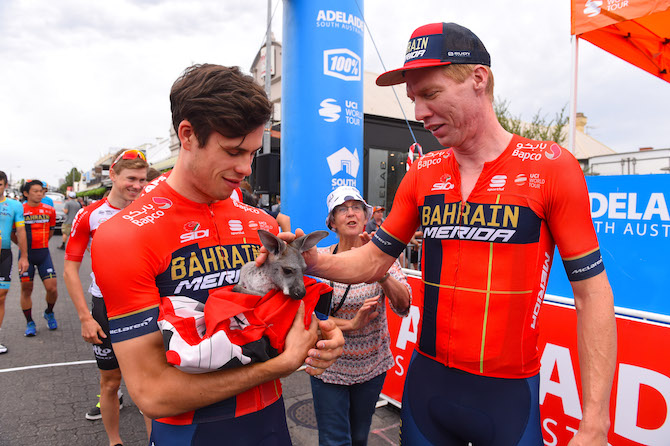
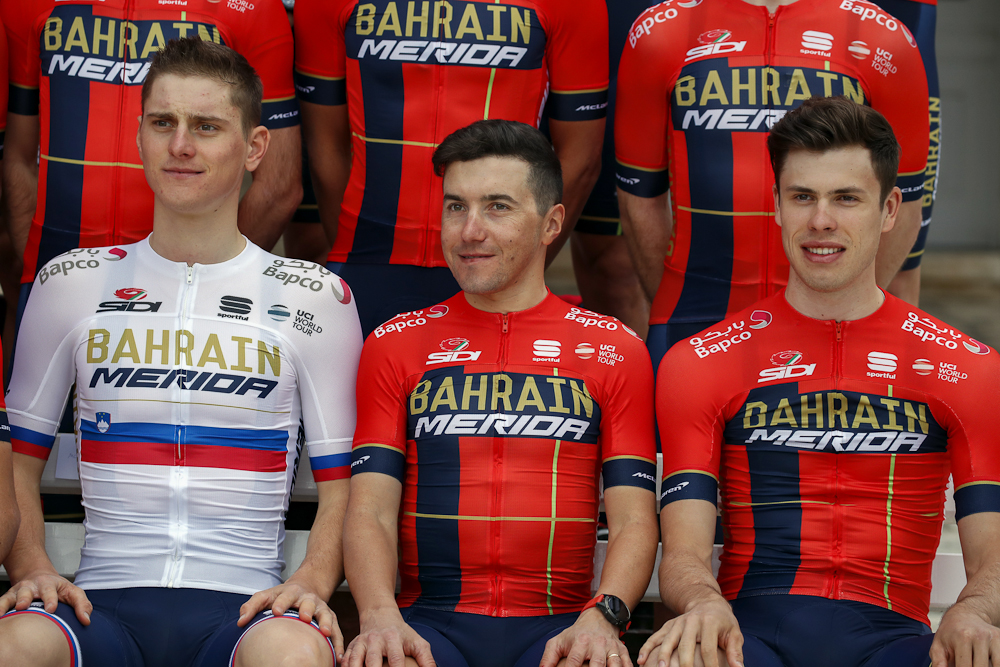
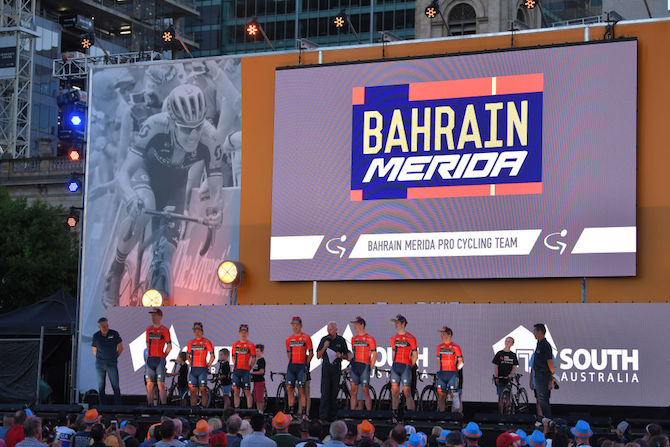
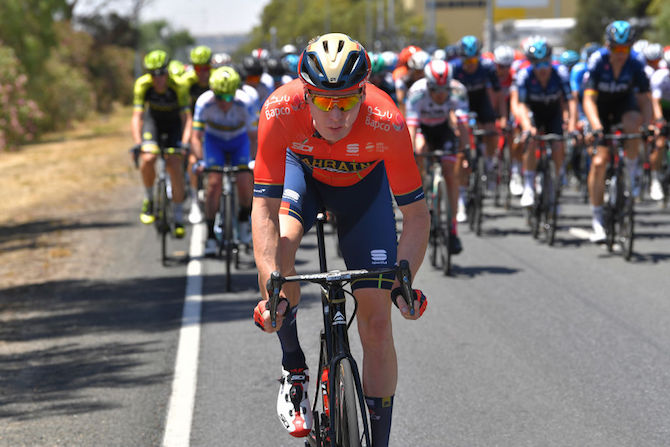
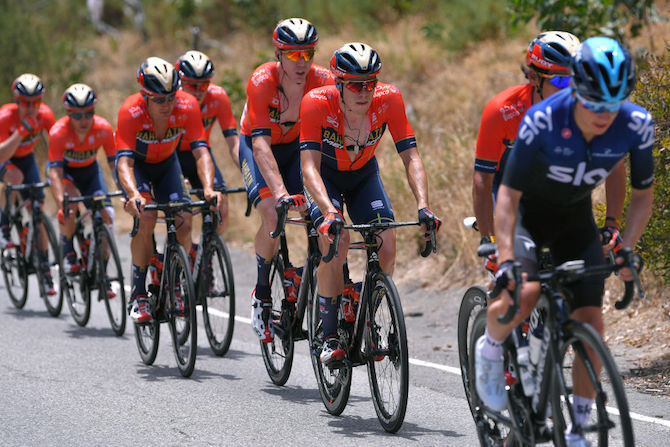
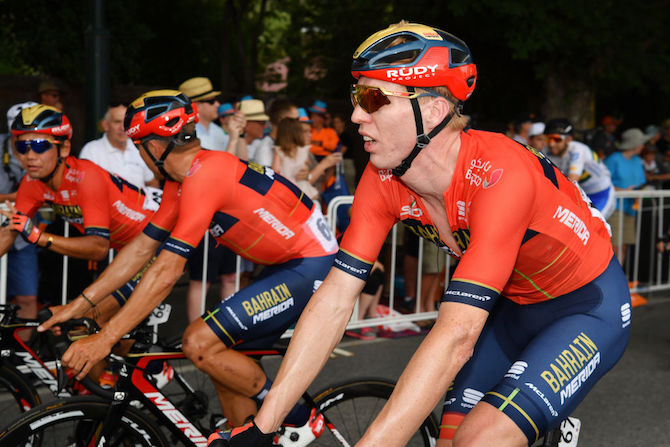
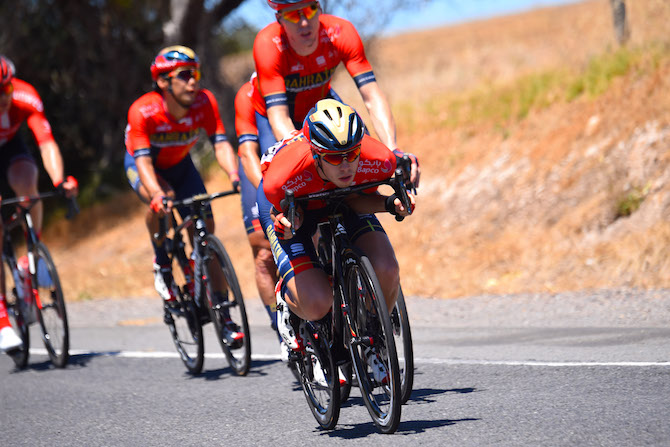
The 2018/19 transfer market saw Bahrain-Merida splash out on both a new sprinter in Phil Bauhaus and a veteran member of Andre Greipel's old lead-out train, Marcel Sieberg.
Both Bauhaus and Sieberg have different points to prove after difficult periods during last season, but at the Tour Down Under in January, Cyclingnews sat down with the two riders to talk about last year, their working relationship, the past, and how they envisage racing together this year on their new team.
Cyclingnews: Phil, can you share some of the details in terms of how you arrived at Bahrain-Merida from Team Sunweb?
Phil Bauhaus: There was the opportunity to sign me and the team was also looking for a rider who could support me in the finals. They made contact with Marcel, and he was also a situation whereby he didn’t know what was happening with him and Andre [Greipel].
Marcel Sieberg: We have the same manager – Christian Baumer – and he asked me in March about joining Phil at Bahrain. For me, it was too early, after 11 years with Andre, to say yes in March. Andre wasn’t sure what he wanted – if wanted to go or stay at Lotto. Then, at the German national championships, I had another talk with Brent [Copeland, Bahrain manager] on the phone and I said yes. Phil lives two kilometres from my house, and my wife used to train him when he was younger, and it made sense for me to try something new. I made the decision before the Tour de France because I wanted to finalise my future.
CN: Was that a difficult situation with you and Andre, when you had tell him that you were leaving?
MS: For sure, but in this situation he didn’t know the direction he was going in. I told him I had an offer. I only had a few days to make a decision, and when I told him, he wasn’t happy with the situation, but I think that he understood. It wasn’t easy for either of us. We’re the same age and we’ve been together for 11 years. We grew up as little boys, and I’ve known him since we were 12 years old. We used to race against each other, then as juniors together on the national team, and then at Highroad. Now I’m looking forward to the new challenge. I’m happy.
Get The Leadout Newsletter
The latest race content, interviews, features, reviews and expert buying guides, direct to your inbox!
PB: In terms of how I signed for Bahrain-Merida, my 2017 season was good and the start to my 2018 season was even better. It was quite early in the season that I had offers from teams – not just Bahrain-Merida but also from other teams. For sure, I also talked to Sunweb and negotiated with them but for me the sporting part was always the most important. It was clear from the beginning that at Bahrain-Merida I would be the captain in the sprints, and they wanted a core of two or three riders around me. With [Heinrich] Haussler already in the team, who is still one of the fastest guys, they had a really good rider.
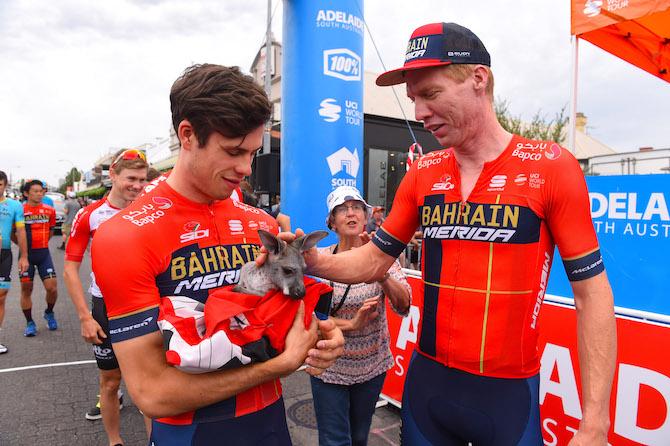
CN: You and Sonny Colbrelli are different riders, but are both still sprinters. How will it work?
PB: We have different race programmes. I’m not doing that many races with him, and if we do some races together, we’ll see what shape we’re both in, and how the final suits us. Sonny has shown in the past that he’s super strong, and I’ve shown in the past that I can be competitive in the bunch sprints, so I don’t think that there’s going to be problem. I’m OK with supporting him and I think he’s happy to help me if the sprint is better for me.
CN: Phil, what’s your ideal lead-out from the team in terms of personnel?
PB: Heinrich in front of me and then Marcel ahead of him. Marcel has shown in the past that he has this really good overview in the bunch. He knows how a team has to ride and where they need to be. He’s experienced that in the lead-out train with Andre and was really successful. I hope that I can learn a lot from that. Then with Heinrich at the end, it’s more about the power and positioning. Marcel will be guiding us and making sure that we’re as fresh as possible.
CN: Marcel, how does Phil compare with the sprinters you’ve worked with in the past? Not just Andre but maybe even a bit further back, like with Mark Cavendish.
MS: Well, when you asked Phil about the sprint train, I wouldn’t really call it a sprint train because at the moment we have three guys. We have other good riders and maybe we can get into position, but as it wasn’t the main goal of the team to build a whole sprint train for Phil yet. It’s always difficult with three guys in the finale. You have to see what’s happening and you have to adapt. Bahrain-Merida is about more than just having a sprint train.
So, to compare, when we started with Highroad and then moved to Lotto with three or four guys like Adam Hansen and Vincente Reynes at the time, we built up from year to year. We had guys come in who at the start didn’t know they would be good in the sprint train, but they came and had good values. When Phil shows that he can win races then maybe he will have another guy to support him. When you compare it with Lotto and there were seven guys with Andre, this isn’t the situation we have at the moment on this team.
Also, it’s important to understand that even at a race like the Tour de France there’s not much room for the classic sprint train. The last Tour I did it was mess. You’d get to the finish and sometimes each sprinter would just have three guys left.
CN: How would you have felt if Mark Cavendish had come to the team? There was some speculation about this around September time of 2018.
PB: For me it wasn’t a big topic. I was super confident in my decision to join this team. It was clear that I would be the captain for the sprints. I had a small talk with the team management and they told me it was possible that he could join the team, but for me it was never a problem. I was never afraid. I was just confident that I made the right decision and I feel that now. I’m super happy. Even if he'd joined the team, it wouldn’t have been a problem for me. I guess that we would have done different race programmes.
CN: It’s only early days but how does the support at Bahrain-Merida compare to what you had on Team Sunweb?
PB: Every team works differently I guess but I feel super supported here. Everyday we have massage. We have a doctor with us, and a coach. I don’t want to speak bad about Sunweb but there are differences. Here I get supported 100 per cent to achieve my goals. It was also like that at Sunweb, and every team works at a high level. Maybe the massage time here is a bit longer, which is nice, but it's more or less not a big difference.
CN: Was it difficult to maintain motivation in the second half of last season at Sunweb when it was known that you were moving teams?
PB: Not at all. I’m a rider who is always super motivated for every chance that I get. I’m young, and on the start-line of every race, I want to do the best that I can. There was a period when I wasn’t in such super shape. My first race back was London [RideLondon-Surrey Classic, after a break in July], and I was sixth, and then there was just a point after that when I got sick.
I tried to come back too soon, and that was mistake. We still had the goal of me doing the Vuelta a España, but hindsight is a wonderful thing, and maybe I should have started coming back at an easier level. They weren’t serious problems, but I had a cold and wasn’t feeling 100 per cent well. That’s why I had no real results at the end of the season, but I was still always super motivated to help my team. I think that the team appreciated that. They still offered me a contract, and I gave them my respect.
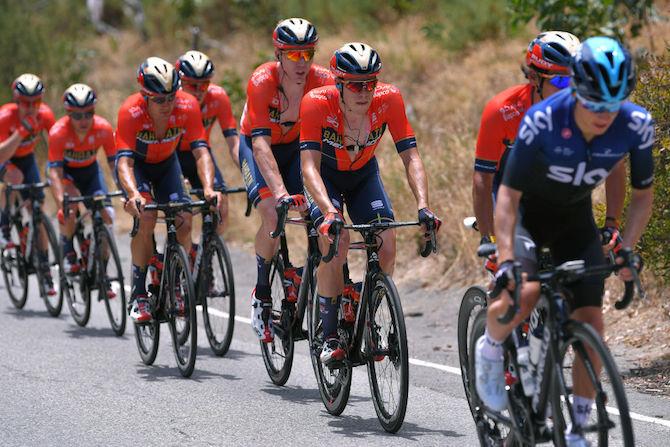
CN: Marcel, when it came to the end of the line with Lotto Soudal, was there even the option for you to stay there and work with Caleb Ewan, and how does it feel to put that chapter of your life behind you?
MS: We had a new CEO at Lotto who came last year, but I was already out of the team. He mixed up a lot of things. He wanted to do something new and change a lot of things, so for me there wasn't much chance of staying. There were some talks, but I was told that there wasn’t, at that moment, an offer, and from that moment it really hurt in my heart because for eight years I had given 110 per cent for the team. Then one guy just wanted to change everything, and from the moment I heard that, I was finished with the team.
It wasn’t that I wasn’t motivated after that point, but my heart was bleeding, if I'm honest, and so then I tried to do my best for Andre, so that he could finish those 11 years he'd had at the team in the best way possible. But in the end they gave me a bit of a shit programme because they didn’t send me to races with Andre, and so after the Tour of Germany I had to do a different programme from him.
I wasn’t happy with that, but I still gave my best. I broke my foot in September and that meant that I missed what would have been my last race with Andre. I broke my foot just four days before the race, so let's just say that it shouldn’t have ended like that after so many years together.
CN: Are you still as close with Andre as you were before?
MS: We stay in contact, but we’re in different places. He’s at a training camp and I’m here [at the Tour Down Under]. We’re texting, for sure, but it’s not like it was before. After so many years, I think that’s to be expected, but he has a different race programme so I don’t think that I’ll see him as much this year.
CN: How does it feel that all those changes at Lotto took place within that one year, and the new CEO who came in at that time has now already gone?
MS: There’s a reason why he had to leave.
CN: Phil, if that was the end of an era, do you think that this could be the start of one?
PB: I hope so. I don’t know how long for. Marcel is 36, but I hope that he can race with me for a couple of years and that he ends his career with me. I feel really well supported here with Marcel and Heinrich, and I hope that I can win more races.
Daniel Benson was the Editor in Chief at Cyclingnews.com between 2008 and 2022. Based in the UK, he joined the Cyclingnews team in 2008 as the site's first UK-based Managing Editor. In that time, he reported on over a dozen editions of the Tour de France, several World Championships, the Tour Down Under, Spring Classics, and the London 2012 Olympic Games. With the help of the excellent editorial team, he ran the coverage on Cyclingnews and has interviewed leading figures in the sport including UCI Presidents and Tour de France winners.
